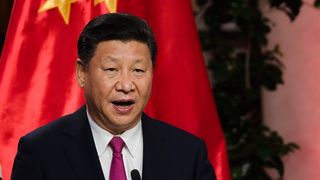If Australian-Chinese relations weren’t already rocky enough, Beijing just gave Canberra 10 days to explain why China shouldn’t impose tariffs of up to 80 per cent on Australian barley exports.
China claims that Australian farmers receive government subsidies, thereby unfairly competing against Chinese barley producers and running afoul of WTO agreements. This is notwithstanding the fact that Chinese agriculture is among the most subsidised in the world, and Australian the least. It is questionable timing, given the recent threats of economic retaliation from the Chinese embassy in Canberra.
Since 32.6 per cent of Australian exports go to China, Beijing has the ability to act on these threats. But Australia is not as vulnerable to this coercion as it appears.
Australia produces the iron ore, coal, gas, wheat and other raw materials that China relies on to remain the world’s factory and feed its 1.3 billion people.
Trade theory supports the logic of the bilateral trade relationship. Australia produces the iron ore, coal, gas, wheat and other raw materials that China relies on to remain the world’s factory and feed its 1.3 billion people. But at the same time, it would be difficult for China to source alternatives for many of these commodities. New iron or coal mines are not opened quickly, and Chinese investors have an enormous financial stake in Australian production facilities.
Furthermore, many of these commodities are traded in open markets and are purchased under long-term contracts by customers who appreciate Australia’s reliability. Recall that in November 2018, China made identical threats against Australian barley in the wake of Australia's Pacific Step-Up Policy before backing off.
In his comments last month, the Chinese ambassador to Australia, Cheng Jingye, notably did not mention commodities in his threat about Chinese consumers potentially boycotting Australian goods. Nor did he threaten a government-led boycott of Australian goods and services as this would have violated the trade agreements between the two countries. Instead, he simply stated that the "Chinese public is frustrated, dismayed and disappointed with what Australia is doing now," and suggested that Chinese tourists and Chinese students "may have second thoughts" about travelling to "such a country that is not so friendly to China." These threats, of course, were in response to Australia’s call for an independent investigation into the source of the COVID-19 pandemic.'
Australia is not alone in having its exports threatened by the Chinese government. Japan, South Korea, Taiwan, the Philippines, Norway and others have all had their trade with China disrupted after making political decisions that angered Beijing. Late last year, China’s ambassador to Denmark threatened a free trade agreement with the Faroe Islands if the Danish outpost refused to sign a 5G contract with Huawei. In Germany, China’s ambassador stated that if Germany decided "to exclude Huawei, this will have consequences. You sell a million cars per year in China. We may also declare them unsafe". And earlier this year, the Chinese embassy in Prague warned the Czech President’s office of retaliation against Czech companies if a senior lawmaker visited Taiwan, writing that "Czech companies who have economic interests in China will have to pay".
With both of the major Australian political parties taking an increasingly similar approach to the bilateral relationship with China, companies should recognise that Canberra’s actions to protect the sovereignty of Australia will continue to produce irritants for Beijing.
These threats — veiled or otherwise — are not usually acted upon by China. But Philippine bananas and tourism, Norwegian salmon, Australian wine, and a host of Korean and Japanese products have all been targeted.
As a matter of good business practice, non-commodity companies with a high reliance on China must take seriously the possibility of these threats being implemented. And with both of the major Australian political parties taking an increasingly similar approach to the bilateral relationship with China, companies should recognise that Canberra’s actions to protect the sovereignty of Australia will continue to produce irritants for Beijing.
The answer for the private sector is obvious, even if it is challenging. Greater diversification of export markets will lessen the coercive power Beijing — or, any other country — can exert on Australia, and reduce risks for Australian businesses.
Australian exports to the region are minuscule compared to exports to China. Some of this can be explained by a lower demand for commodities in these countries, some by the fact that in certain sectors these countries are actually competitors, and some by problematic trade regimes. But many Asian and South Asian nations are also seeking diversification away from China and would benefit from Australian ties in terms of management, production, contacts, and value-added supply chains.
This will require on-the-ground investment of time as well as money. It will take the Australian government and industry working together with host governments and industry to affect a new supply chain. It will not be the "put it on a ship and collect the cash" model of the China trade. The margins on this business will likely be smaller, but between COVID-19 and the ongoing threats to trade from the People's Republic of China, the effort is necessary.
Historically, it is in the direct aftermath of existential challenges that businesses, communities and nations re-examine the costs, benefits and extent of their security — and what insurance they require. In the aftermath of the coronavirus, resilience and security have become critical markers both for national and corporate resilience. Both are achievable, though neither will come easily or on the cheap.






